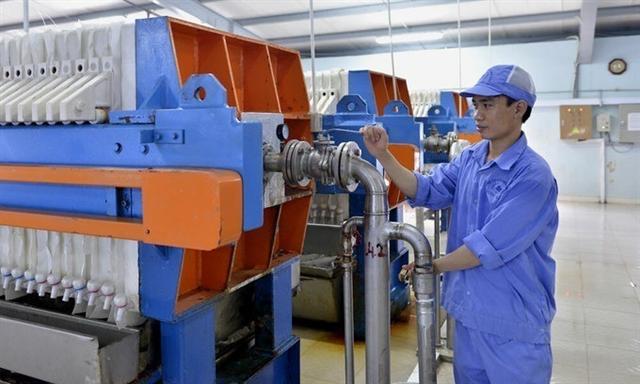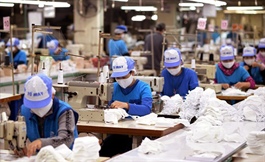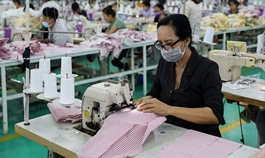Manufacturing sector slump continues
Manufacturing sector slump continues
The current wave of Covid-19 caused a further disruption across Vietnam’s manufacturing sector in July, with the manufacturing purchasing managers’ index falling below 50, according to IHS Markit.
An employee operates an agar manufacturing machine in the northern province of Bac Giang. Photo by Shutterstock/Bamboovn.
|
The PMI stood at 45.1 in July, compared with 44.1 in June, signaling a deterioration in business conditions for a second consecutive month, a report by the UK-based global information provider showed Monday.
A PMI reading above 50 indicates expansion in the manufacturing sector compared to the previous month while 50 indicates no change.
"The current wave of the Covid-19 pandemic is having a severe impact on Vietnamese manufacturers, according to the latest PMI data, with company closures and social distancing contributing to a steep drop off in production," Andrew Harker, economics director at IHS Markit, said.
The rates of decline in output and new orders quickened from the previous month and employment was down sharply amid reports of temporary company closures and social distancing restrictions.
Meanwhile, disruption was also felt in supply chains, with delivery times lengthening to the greatest extent in more than 10 years of IHS Markit’s data collection. The rate of input cost inflation accelerated sharply, but efforts to secure orders meant that firms raised their selling prices at a relatively modest pace.
Alongside lower total new orders, new business from abroad was also down. That said, the reduction in exports was softer than that seen for total new business amid some reports of improving demand in international markets.
Lower workloads, temporary closures and limits on staff numbers due to social distancing requirements meant that employment decreased markedly for a second month running.
While disruption to operations led to work backlogs building up at some firms, this was outweighed by a sharp drop in new orders. Overall, outstanding business decreased moderately. Severe disruption to supply chains was noted in July, with the extent of delivery delays the most marked since IHS Markit’s survey began more than a decade ago.
IHS Markit linked longer lead times to difficulties with transport both domestically and internationally due to the pandemic as well as raw material shortages. Manufacturers were also faced with surging input costs.


























